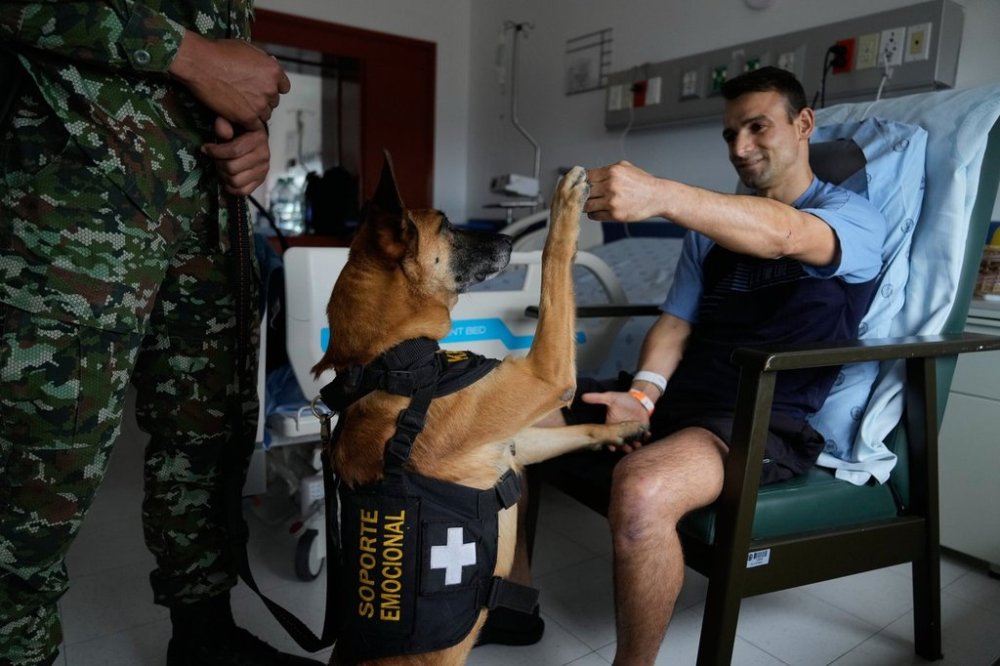Colombian soldiers find solace in ‘furry force’ emotional support dogs
Advertisement
Read this article for free:
or
Already have an account? Log in here »
To continue reading, please subscribe:
Monthly Digital Subscription
$1 per week for 24 weeks*
- Enjoy unlimited reading on winnipegfreepress.com
- Read the E-Edition, our digital replica newspaper
- Access News Break, our award-winning app
- Play interactive puzzles
*Billed as $4.00 plus GST every four weeks. After 24 weeks, price increases to the regular rate of $19.00 plus GST every four weeks. Offer available to new and qualified returning subscribers only. Cancel any time.
Monthly Digital Subscription
$4.75/week*
- Enjoy unlimited reading on winnipegfreepress.com
- Read the E-Edition, our digital replica newspaper
- Access News Break, our award-winning app
- Play interactive puzzles
*Billed as $19 plus GST every four weeks. Cancel any time.
To continue reading, please subscribe:
Add Winnipeg Free Press access to your Brandon Sun subscription for only
$1 for the first 4 weeks*
*$1 will be added to your next bill. After your 4 weeks access is complete your rate will increase by $0.00 a X percent off the regular rate.
Read unlimited articles for free today:
or
Already have an account? Log in here »
BOGOTA. Colombia (AP) — At the Central Military Hospital in Bogota, an unusual unit patrols the hallways with a mission unlike any other battalion: lifting the spirits of soldiers wounded in combat.
Kratos, Rafa and Lupa make up the so-called “furry force,” a group of emotional support dogs that visit service members recovering after being injured in clashes with Colombia’s illegal armed groups.
One by one, the three dogs enter the room of 2nd Sgt. Jeisson Sánchez Duque, who was shot during fighting in the northwest province of Antioquia. Kratos, the most senior of the dogs, greeted him with a paw after receiving treats. Then, Lupa settled on the floor and Sánchez brushed her as he remained seated due to his back injury.

“It’s something different … you forget the pain and focus on the dogs,” Sánchez told The Associated Press.
Soldiers are still battling the scars from a decades-long conflict in Colombia that led to 450,000 people killed and forced 7 million to flee their homes. Despite a 2016 peace agreement between the government and the country’s largest guerrilla group the FARC, various armed groups still operate in Colombia. These groups, including some who broke from the FARC, dispute territories vacated by the FARC and the valuable illicit economies that run through them, including drug trafficking.
Launched in April 2024 after a visit from an animal care organization, the program aims to provide psychological support and ease recovery for soldiers facing both physical and emotional scars, including amputations from landmines and injuries from drones dropping explosives.
According to the U.N. Office for the Coordination of Humanitarian Affairs (OCHA), incidents involving explosive devices in Colombia rose 94% between January and July compared to the same period in 2024. The hospital has also noted an increase in patients who have been injured by explosives launched by drones.
Kratos was donated by the Air Force, then Rafa by the Army and then two more dogs were donated by the hospital’s doctors.
The program has since expanded to let patients bring their own dogs and provide wellness breaks for staff.
“(The dogs) show a benefit in patient recovery, supported by physiological changes that occur during interactions, which we might view as recreational, but in this case, they are therapeutic for patients,” Eliana Patricia Ramírez, the hospital’s deputy medical director, explained to the AP.
For soldier Luis Miguel López, who lost part of his leg to a mine in Puerto Valdivia in Antioquia province, the dogs’ visits helped break through the depression he felt while in the hospital.
The experience also reminded him of Goma, an anti-explosives dog who saved his unit several times before being killed by a blast.
“I was so depressed in my room, because I was holed up in there. My wife gave me support but it wasn’t the same,” he said.
“When those dogs come in, they change you because they bring happiness.”
____
Follow AP’s coverage of Latin America and the Caribbean at https://apnews.com/hub/latin-america

